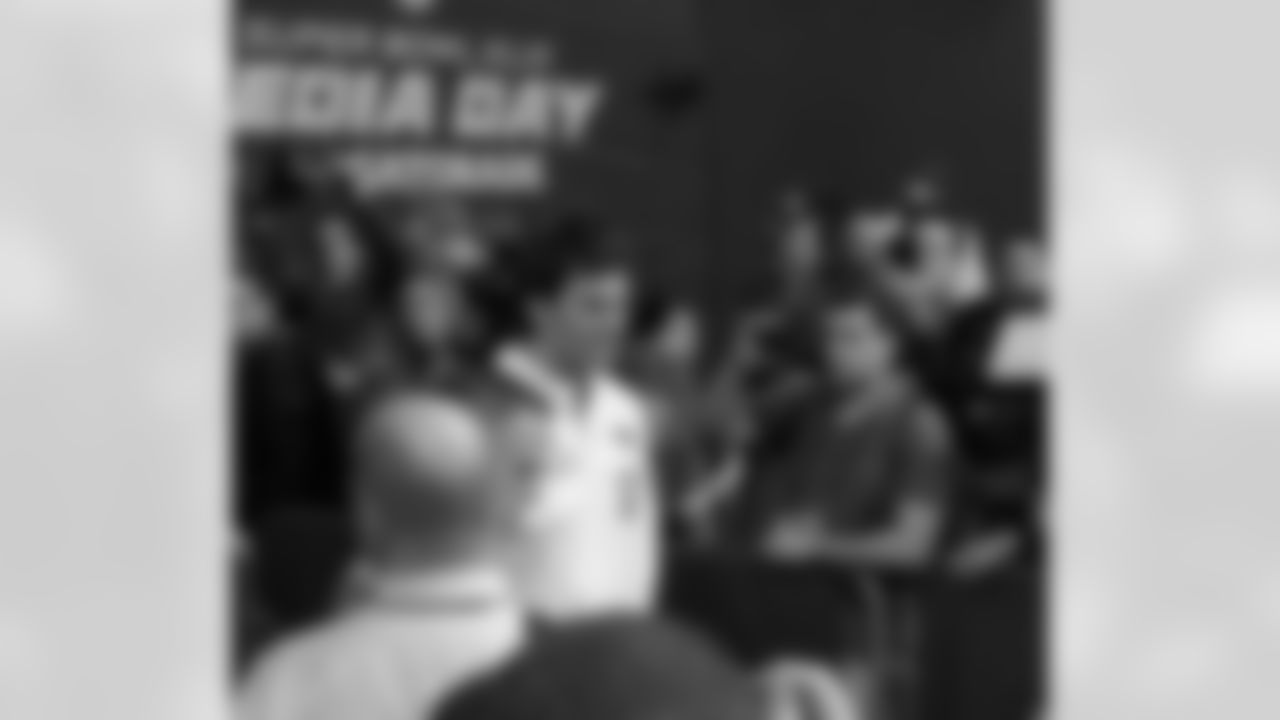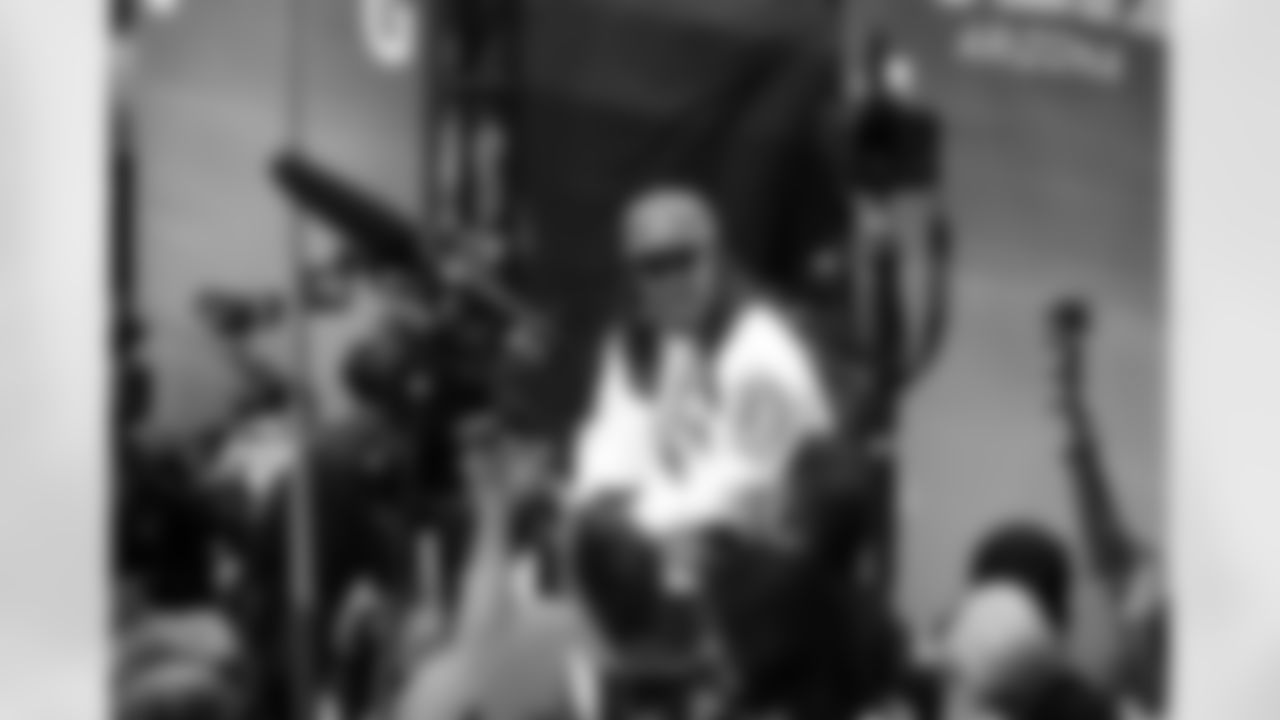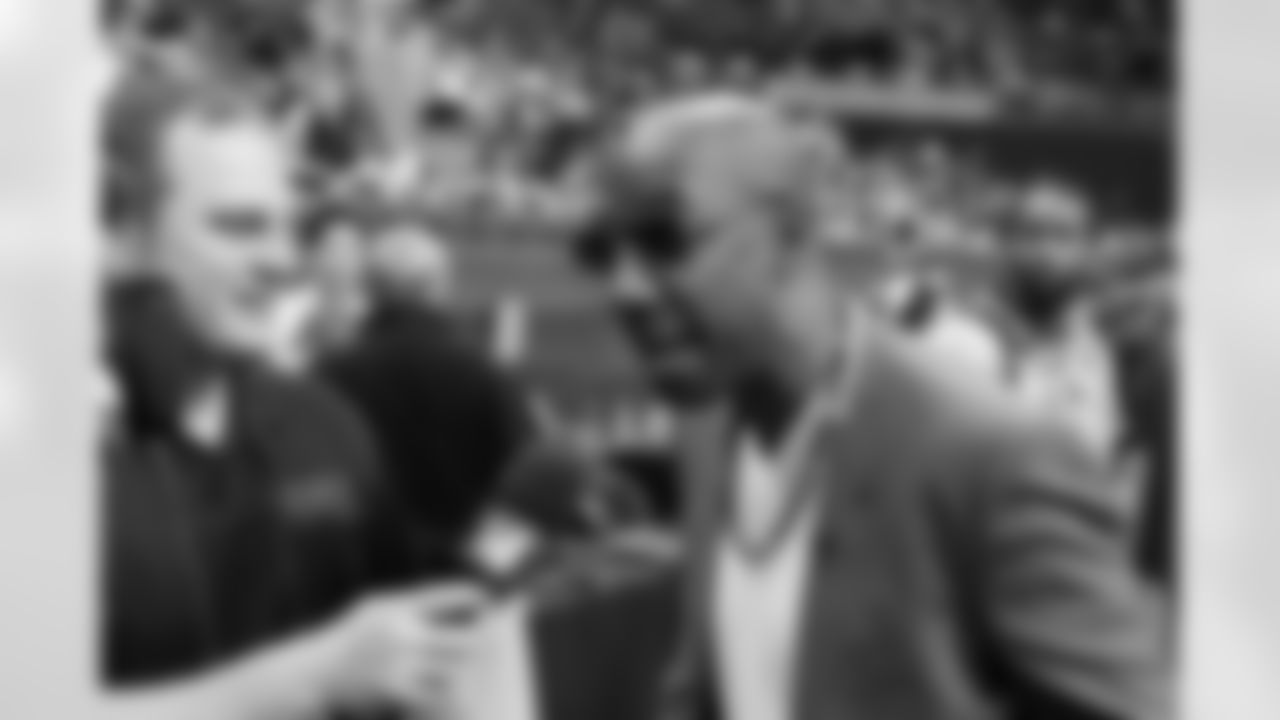Seahawks running back Marshawn Lynch sits at his podium during his brief interview session Tuesday at Super Bowl media day.
Seahawks running back Marshawn Lynch strolled into Super Bowl media day on Tuesday at U.S. Airways Center with a hat atop his head, sunglasses covering his eyes and a big smile on his face.
After stopping for quick chats with a few teammates and ex-NFL players, he made his way to podium No. 6, the one outfitted with his name in capital letters and a Super Bowl XLIX backdrop behind its chair.
The mass of media huddled around and prepared to fire questions his way for the duration of the hour-long session, hoping to delve into the mind of one of the game's best running backs and most interesting figures.
But much like in the past, Lynch was in no mood to make any public comments. He began the session with a promise, then followed through for the next five minutes, rarely deviating from the line "I'm just here so I don't get fined" no matter the query.
"Y'all can sit here and ask me all the questions y'all want to," Lynch said before the interview began. "I'm going to answer with the same answer."
After a timer went off on his phone, Lynch rose from his chair and headed out, disappearing with more than 57 minutes
remaining on the media availability clock. And so continued the media battle between "Beast Mode" and the NFL.
Tuesday was the height of the NFL's media frenzy, a day when members of the Seahawks and Patriots answered a wide variety of questions from outlets near and far. Some of it was for show, like the reporter for the local radio affiliate who dressed up in a barrel, a cowboy hat and nothing else.
While Lynch left early and the inevitable Deflategate questions elicited some curt answers from the Patriots, most players seemed to enjoy the spectacle, reveling in the attention leading up to the country's most colossal sporting event.
"This is unbelievable," Seahawks safety Earl Thomas said. "I'm soaking it all in."
During the season, the interactions are not always so jovial. Regardless of whether a team is good or bad, or whether a locker room is drama-free or drama-filled, the NFL has a policy in which every player must speak at least twice a week -- once during the lead-up and again postgame.
A guy like Seahawks cornerback Richard Sherman relishes it, and it's his media bombasts which have made him one of the most recognizable players in the league. Lynch is the polar opposite, preferring not to talk no matter how he performs on the field.
But those who refuse to meet the minimum requirements are subject to NFL fines, and it's the reason why Lynch makes half-hearted attempts to fulfill his media obligations, even when he has nothing of substance to say.
"I understand where the NFL is coming from," Cardinals cornerback Justin Bethel said. "They want the fans involved with us and us involved with the fans. But every guy is different. Some guys aren't talkers and there is some media trying to attack certain guys, trying to get you to say things so they can exploit it. I understand where (Lynch) is coming from and I understand where the league is coming from. I think it's just his personality (to shy away)."
Lynch has never totally explained his disdain for the media, whether it's a suspicion of the profession or a nervousness with
public speaking. His most illuminating interview of recent memory came at last year's Super Bowl media day, when he told NFL Network's Deion Sanders that he doesn't like interviews because "I'm just about that action, boss."
Defensive end Calais Campbell is one of the Cardinals' most gracious and willing interviewees, rarely turning down a request despite the high demand for a player of his caliber, and over time he's developed a sense of comfort in the setting. It wasn't always like that, though.
"Talking to the media with a camera in your face – I've grown a long way," Campbell said. "I remember my first interview. I was stuttering like crazy, talking really fast. I could still probably get better at it, but the more you do it, the more comfortable you get."
He said he understands where guys like Lynch are coming from -- especially when they are forced to do interviews with dictated times and locations -- but believes it's a player's duty to connect with the spectators since their rabid interest results in the players' lavish salaries.
"Any time something's mandatory, it's always tough," Campbell said. "You almost have that natural rebellion mindset. I understand the power of the media, and I understand it's an avenue to reach the fans. The fans are who pay the bills, and they're the ones who get you to the Pro Bowls and make the game so much more fun.
"I like to make sure I give them my message. By talking to the media, they get to hear my voice, instead of someone writing about me but never really interviewing me. It's much better to talk to the media and give your side of the story."
Plenty of players subscribe to Campbell's mindset, but to others, the responsibilities are too much.
There were instances this year when cornerback Antonio Cromartie was a willing interview, other times a begrudging one, and some stints when he declined to speak. Get him in the right mood, and he was an interesting conversationalist, but the steady stream of requests bogged him down.
"Honestly, I can't even answer that question," said Cromartie, when asked if the NFL should make players do interviews. "I don't even like talking to you guys. I don't think it should be (mandatory), but it's not our rule. It's the NFL's rule."
Cornerback Patrick Peterson is one of the more media-friendly stars on the Cardinals, yet believes the players should have the option to forgo interviews.
"Me, personally, I think there should be more wiggle room with the interviewing," Peterson said. "But the league has put rules in place and you know you have to abide by them. I don't see a problem with (Lynch) not wanting to speak to the media, but at the same time, it is our job to go out and give our input on the game."
Lynch has put up a high-profile fight against doing interviews, but the NFL is not backing down, continually fining him when he declines to speak. His media obligations extend to Wednesday and Thursday leading up to Sunday's Super Bowl, so Lynch must decide on a few more boilerplate responses.
Clearly, every player has his own idea what the media duties should be.
One thing Campbell learned a long time ago, though, is the requests never stop, and life is a lot easier on those who accept the situation. In fact, he's used the medium to his advantage. Not only does Campbell oblige to traditional interviews, he also hosts the weekly Cardinals-centric Big Red Rage radio show throughout the season.
"In the end, we're a business," Campbell said. "This is a big business. You have the opportunity to brand yourself to where you can make a good living for the rest of your life. You may as well use it to your advantage."
Some pictures from Media Day at U.S. Airways Center

Guess what day it is?

The Arizona State band was on hand to add some flair

Lots and lots of ... everybody

A Cardinals cheerleader signs an autograph

Big Red has some lunch

Patriots QB Tom Brady arrives for the interview session

Patriots DT Alan Branch, a former Cardinal

Cardinals cheerleaders

Patriots OL Dan Connolly watches a coin flipped by a Nickelodeon correspondent

Cardinals QB Drew Stanton signs for a fan

Seahawks RB Marshawn Lynch

Fans take in the spectacle

Patriots QB Tom Brady as the center of attention

Cardinals cheerleaders

NFL Network's Kurt Warner is interviewed for Inside Edition by former Olympic gymnast Shawn Johnson

The Mexican Go-Pro helmet guy poses with two Seahawks cheerleaders. Because it's Media Day.

Seahawks RB Marshawn Lynch draws a huge crowd for his five minutes on the podium

Seahawks OL Patrick Lewis poses with two puppets from a Mexican TV station. Because it's Media Day

Signing autographs, Cardinals CB Patrick Peterson poses with a fan

Cardinals cheerleaders

Seahawks QB Russell Wilson

Actor J.B. Smoove

Media Day















